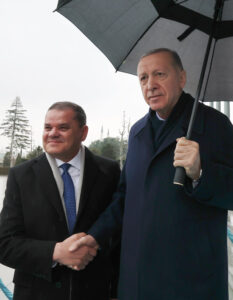Abdullah Bozkurt/Stockholm
Some Syrian jihadist fighters deployed to Libya by Turkey have moved to Europe and other regions offering greater benefits, according to a report submitted to the UN Security Council.
Based on confidential sources, UN investigators identified at least 13 cases of Syrian fighters transferred to Italy, apparently with the assistance of Libyan military authorities who used migrant smuggling networks in Tripoli.
Turkey’s Islamist government, led by President Recep Tayyip Erdogan, has transported thousands of Syrian jihadist fighters to Libya to bolster Turkey-backed factions. The deployment has been accompanied by the significant presence of Turkish military and intelligence assets in Libya, a country plagued by civil war and instability since the Arab Spring revolutions of 2011.
Turkey provides Syrian mercenaries with monthly salaries, logistical support and the promise of Turkish citizenship for both the fighters and their families.
The vetting and selection process for these fighters was carried out by Turkey’s intelligence agency, MIT, which has been collaborating with jihadist groups in Syria since 2011 in an effort to overthrow Bashar al-Assad, a goal that was achieved in December.
“Syrian fighters backed by Türkiye remained present in several locations around Tripoli, including in the Hamza Camp, Watiyah airbase, Salah Eddine police school and Suq al-Khamis area,” said a report submitted to the UN Security Council on December 6, 2024 by the Panel of Experts on Libya.
Excerpts from the UN Security Council report on Syrian fighters in Libya:
The experts noted that reductions in salary and other financial benefits had led some fighters to seek opportunities in conflict zones with higher pay or to migrate to Europe, blending in with migrant smugglers.
This situation poses a significant security risk for European countries receiving these battle-hardened fighters, who are committed to jihadist ideologies, trained in the use of arms and explosives and equipped with sabotage and infiltration tactics provided by Turkish intelligence.
The highly sensitive issue was discussed during a visit by Italian Prime Minister Giorgia Meloni, who sought assistance from Turkish President Erdogan in January 2024. Meloni asked for assurances from Erdogan, who has been known to use the migration issue as a leverage in negotiations with the European Union, to halt the flow of fighters and migrants from Libya and other regions.
Syrian fighters were paid up to $2,000 per month, but financial difficulties faced by the Turkish government, coupled with the declining value of the Turkish lira, led to reductions in their pay. This caused resentment among the Syrian fighters, and at times, even led to demonstrations in Libya.
The UN has deemed Turkey’s deployment of Syrian fighters to Libya an act that threatens the peace, stability and security of Libya as well as one that obstructs or undermines the successful completion of the country’s political transition.

“The presence of foreign fighters and private military companies further destabilized the national security landscape,” the report noted.
In June 2020 UN rapporteurs sent a joint letter to the Turkish government requesting further information about its role in the recruitment, financing, transportation and deployment of Syrian fighters to Libya.
According to the allegations in the letter, Turkey effectively deployed mercenaries to the armed conflict in Libya by recruiting, transporting and paying fighters, including children, from various Syrian armed groups to participate in military operations in Tripoli in support of the Government of National Accord (GNA).
The UN letter also revealed how the Turkish government used its paramilitary contractor SADAT for those operations. “Turkish authorities allegedly contracted private military and security companies to facilitate the selection as well as the preparation of official and contractual documentation for the fighters, apparently in coordination with the Turkish security services. One of the companies cited in this context was Sadat International Defence Consultancy [SADAT],” the letter said.
In response, the Turkish government sent a letter in September 2020 rejecting the allegations as unfounded and accusing the UN rapporteurs of transmitting misleading and biased communications.
The UN investigators identified Syrian fighters deployed to Libya by Turkey, confirming their presence in military camps affiliated with the Government of National Unity (GNU), which replaced the GNA in 2021.
Although Turkey denies its deployment of Syrian fighters to Libya, the Pentagon confirmed for the first time in July 2020 for that Turkey had sent between 3,500 and 3,800 paid Syrian fighters to Libya in the first three months of the year.
The report on counterterrorism operations in Africa by the Pentagon’s inspector general noted that Turkey paid and offered citizenship to thousands of mercenaries fighting alongside Tripoli-based militias against troops of eastern Libya-based commander Khalifa Haftar.
Turkish support for the GNA was pivotal in its success against the rebel opposition led by the Egypt-backed Haftar. Turkey supplied weapons, ammunition and drones while also organizing Syrian mercenaries and jihadists to fight against Haftar’s forces.
The Erdogan government also signed several agreements with Libya, including deals focused on military and defense cooperation as well as a maritime agreement that delineates the Turkey-Libya continental shelf and exclusive economic zone (EEZ).

Beyond ideological support, Erdogan openly acknowledged the strategic importance of Libya’s oil and gas resources to Turkey. During a joint news conference with former Libyan prime minister Fayez al-Sarraj in Ankara on June 4, 2020, Erdogan unveiled plans to expand cooperation, including exploration and drilling operations, to harness natural resources in Libyan territory.
Billions of dollars from Libyan treasury reserves are reportedly sitting in Turkish central bank accounts, earning no interest, while the Erdogan government transferred tons of gold from the Libyan central bank to the Turkish central bank. Additionally, smuggled Libyan oil is said to have made its way to the Turkish market.
Turkey also views its role in Libya as part of a broader strategy to assert its influence in the Mediterranean and North Africa while simultaneously countering regional rivals such as Egypt, France and the United Arab Emirates. President Erdogan considers himself a regional leader with the ability to intervene in conflicts and shape political outcomes across the Middle East and North Africa.












